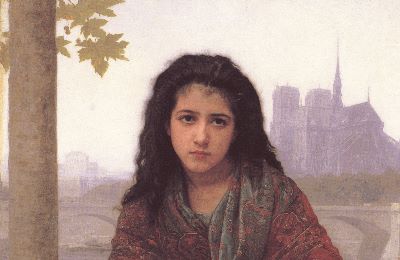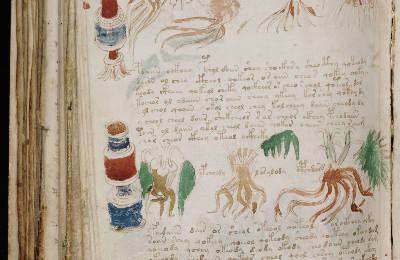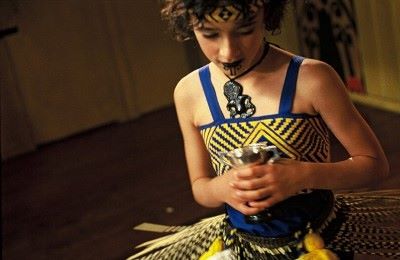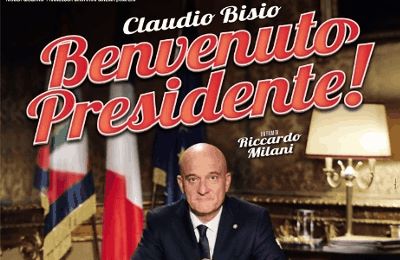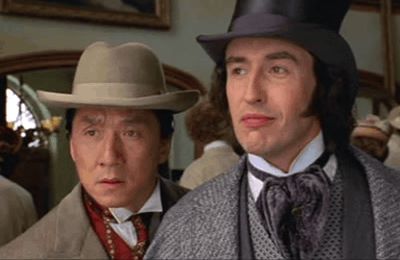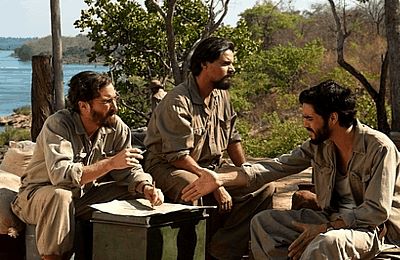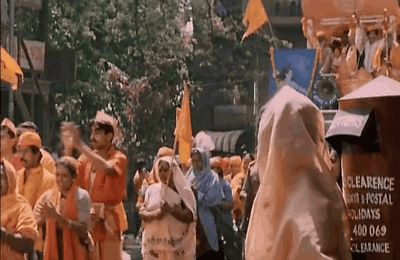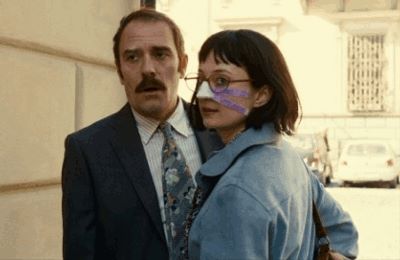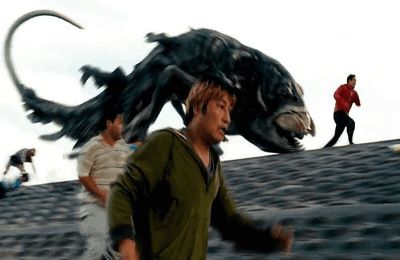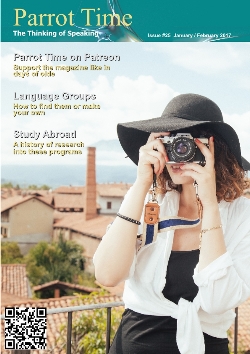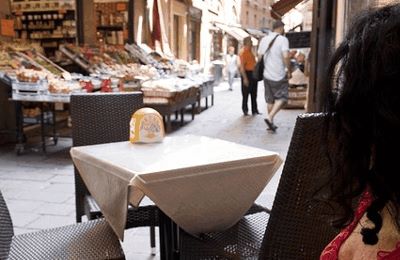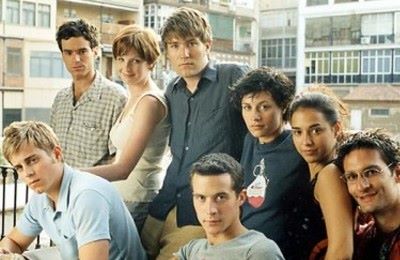At the Cinema
Lost in Translation
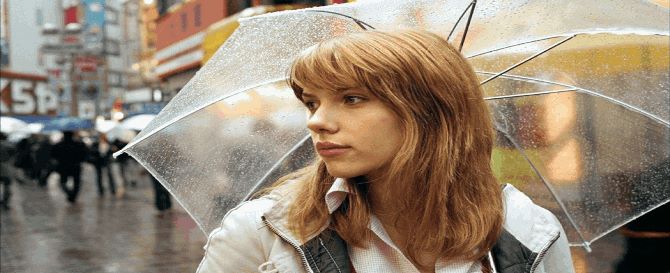
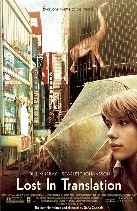 From the title itself, "Lost in Translation" sounds like a great movie about languages. It does have a few languages in it, with the story revolving around two Americans in Japan. English and Japanese are obviously involved, but there are also brief flashes of German and French in a few scenes. Languages are the not reason I am reviewing this movie, however. The story is about Bob Harris, played by Bill Murray, and Charlotte (Scarlett Johansson). Bob is a movie star whose career is fading and he is in Japan doing an advertising campaign for Suntory whisky. Charlotte is the new wife of a photographer who is doing photo shoots in Japan and she finds herself left alone much of the time in the foreign country. We see that both Bob and Charlotte are having trouble sleeping and seem to be walking around in a daze, not really being part of the world around them. They are lost, unsure about where they are in their lives and what they should be doing: Bob is in a loveless marriage of 25 years and Charlotte, while recently graduated from college and only married a year, has no idea what she wants in life. While they are lost in their own thoughts, the culture around them provides them with no enjoyment. It is the backdrop of Japan and its culture that helps us see them go from being lost to found as they are able to adapt to it as well. Eventually, both the characters start talking to each other, since they share the same hotel and can see that the other person seems to be as lost as they are. When Charlotte's husband John travels to another part of Japan for a few days, leaving Charlotte alone again, she decides to go out on the town with some Japanese friends and invites Bob to join them. The two find themselves bonding during their adventures in the Japanese nightlife and as they find themselves coming to life, the culture also becomes something they enjoy. The movie isn't about Japanese culture. It is not trying to make a statement about it, negative or positive, nor does it try to explain it. I think the movie would have worked if it had been set in any number of foreign countries, since it is acting as a metaphor for the characters own emotional confusion. They are struggling to find their place in their own lives as well as in another country. Only when they start to figure out their places through their friendship are they able to really interact with the culture around them. Having said that, the Japanese culture and society is very much on display in the film. When Bob first arrives, exhausted, in Tokyo, he is jarred by everything from the polite business card exchanges to the automatic curtains opening in his hotel room. One very odd scene involves a "Premium Fantasy Woman" who has been sent to his room. She tries to carry out her job of providing Bob with a role-play fantasy, shoving one of her stocking clad legs into his face and insisting that he "lip my stocking". When he finally understands that she means "rip" and attempts to do so, she goes into some confused mix of role-playing, finally lying on the floor on her back, kicking her feet into the air, yelling. When Bob tries to help her up, she latches onto him and pulls him down, causing him to smash the lamp providing them light, plunging them into darkness. We are never told what she was trying to achieve. 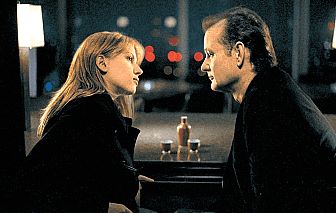 The changing of "r" into "l" is done a few more times in other dialogues before Bob finally understands what is happening. Charlotte asks him why they do that, and he flippantly tells her, "For yucks. Just to mix things up". Probably not the linguistic explanation one would expect. There is a scene early on that is a version of an old translator/interpreter joke. While Bob is doing a photo shoot, holding a glass of the whiskey he is advertising, the photographer is speaking to him loudly and forcefully in Japanese to give him directions. A female translator then tells Bob that he wants Bob to turn his head. The length of what was said and what was translated obviously confuses Bob, and he tries asking about it, but the translator just ignores him. This happens a few more times, with the photographer obviously saying much more than is being repeated. It is a direct representation of the title of the movie, showing that something is lost in the translation. When Bob and Charlotte have their first night on the town, they get chased out of a bar by a BB-gun wielding bartender, run through a few stores, take a taxi with their friends, and finally end up singing (badly) in a Karaoke bar. In another part of the movie, they are in a restaurant trying to order what seems to be several identical dishes on the menu, only to be served with raw meat they must cook at their table themselves. Charlotte hurts her toe at another point and Bob takes her to the hospital, where, while neither of them speak Japanese, they are able to make themselves somewhat understood. 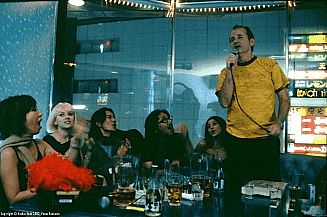 Less hectic aspects of Japanese life are also on display. We see Charlotte traveling to a shrine where monks are chanting, then later she finds herself wandering into an ikebana event (the Japanese art of flower arrangement). She does finally become more comfortable, and is even seen tying a prayer to a tree (one of the customs). The story is about two people struggling to find themselves in their own lives and finding a bond between each other that helps them do that, although we don't know how successful that truly is since we don't see them when they are reunited with their spouses. It is the backdrop of Japan and its culture that helps us see them go from being lost to found as they are able to adapt to it as well. There is a funny bit of trivia regarding the title. In South American Spanish, it was translated as "Perdidos en Tokio", the Chinese title was "Mi Shi Dong Jing", and the Hebrew title in Israel was "Avudim be-Tokio", all of which mean "Lost in Tokyo", so the title itself was lost in translation, literally. These versions were at least closer than some others. In Portuguese, it became "Love is a Strange Place" and in Polish, it was "In Between Words". The movie won a few awards, including an Oscar for best Original Screenplay and received good reviews. It also received an R rating, although this only because of a short scene in the movie that takes place in a strip club in which a woman is shown topless. I don't know why they needed her topless, because otherwise, this movie would have been rated PG-13. There is no violence, no sex besides that scene mentioned, and a minimum of swearing. There is a warning I would give, however, for those who might be offended: the opening title shot is of a woman in panties lying on a bed. Lost in Translation is a very good movie for those that like soul-searching dramas, but it isn't for everyone. You might find it boring, or you might find it very touching and emotional. I hope you do give it chance, however: you might find something yourself. |
| At The Cinema - Lost in Translation | ||||
| Writer: | Erik Zidowecki | |||
| Sources: | ||||
| ||||
| All images are copyright Focus Features, Tohokashinsha Film Company Ltd., American Zoetrope, Elemental Films | ||||
All images are Copyright - CC BY-SA (Creative Commons Share Alike) by their respective owners, except for Petey, which is Public Domain (PD) or unless otherwise noted.
|
Looking for learning materials? Scriveremo Publishing, has lots of fun books and resource to help you learn a language. Click the link below to see our selection of books, availlable for over 30 langauges!
| |
comments powered by Disqus


